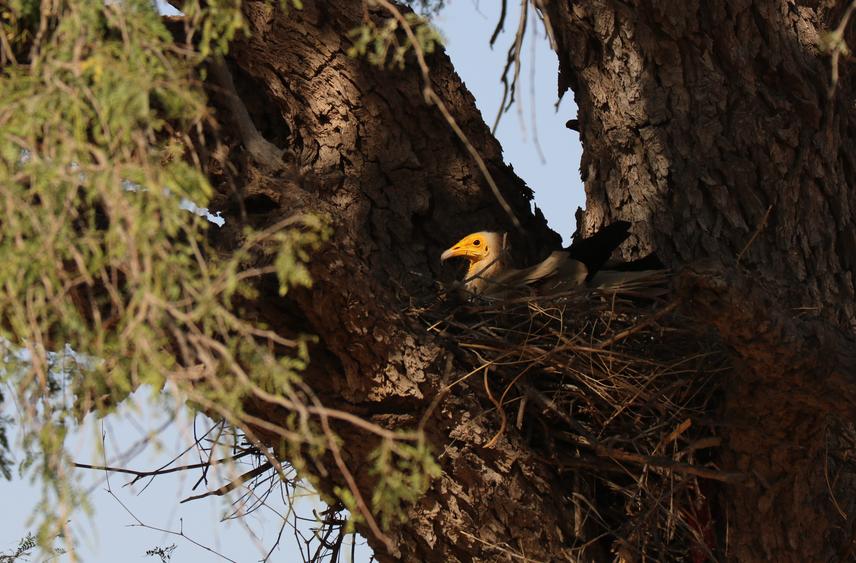Varun Kher
Other projects
13 Feb 2023
How Does Habitat Restoration for the Great Indian Bustard Impact Associated Avifauna of the Thar Desert?
The Thar Desert in north-western India is one of South Asia’s largest open natural ecosystems and a stronghold for several globally threatened bird species. Among these are resident raptors such as the White-rumped Vulture, Red-headed Vulture, Egyptian Vulture, Tawny Eagle, and Laggar Falcon—species that provide crucial ecosystem services but are currently facing serious conservation challenges.

An active nest of Egyptian Vulture Neophron percnopterus, DNP, Jaisalmer. Ⓒ David Phinehas.
This project aims to investigate three critical, interlinked threats to these raptors: food scarcity, nesting failure, and exposure to detrimental veterinary drugs known as NSAIDs (Non-Steroidal Anti-Inflammatory Drugs). While the decline of vultures due to NSAIDs has been well documented, the impact on other raptors, particularly hunters like eagles and falcons that scavenge opportunistically, remains poorly understood. Additionally, factors influencing nesting success, such as prey availability and human disturbance, have received little attention in the region.
Through extensive fieldwork across the Desert National Park Wildlife Sanctuary and surrounding landscapes, the project will identify and monitor nesting sites using ground surveys and remote camera traps. Breeding success will be assessed across seasons to understand the causes of nest failure. Fresh faecal samples will be collected from roosting and nesting sites and analysed using DNA metabarcoding to determine diet composition and quantify reliance on livestock carcasses, one of the primary pathways for NSAID exposure.
To better understand the prevalence of harmful NSAIDs like diclofenac and ketoprofen, we will survey pharmacies and conduct interviews with herders and livestock owners. This information will be used to map NSAID usage patterns and identify risk zones for raptor poisoning.
In parallel, the project will engage in targeted outreach to raise awareness about the impact of NSAIDs on raptor populations. We will work closely with veterinarians, pharmacy owners, and local communities to encourage the use of safer alternatives and share best practices for livestock management. Findings will be shared with the Rajasthan Forest Department and other conservation stakeholders to inform long-term protection efforts and policy implementation. By generating vital ecological data and actively involving local communities, this project will contribute to the conservation of raptors in the Thar Desert and help develop science-based solutions to protect one of India’s most endangered avian guilds.
Header image: A pair of Red-headed Vulture Sarcogyps calvus, DNP, Jaisalmer. Ⓒ Manas Shukla.